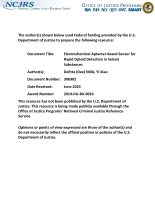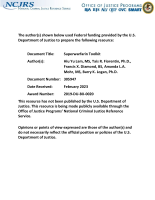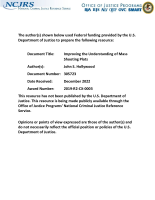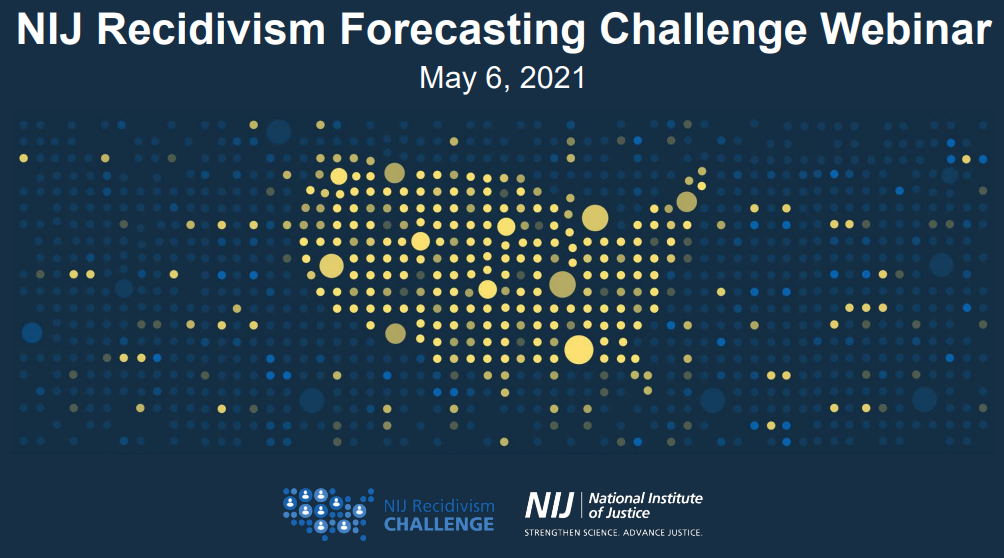First responders
N,N-Dimethylpentylone (NPS Stimulant)
N-Pyrrolidino Etonitazene (NPS Opioid)
Metonitazene (NPS Opioid)
Bromazolam Prevalence Surging Across the United States Driven In Part by Increasing Detections Alongside Fentanyl
Investigation of volatile organic compounds from trace fentanyl powder via passive degradation
Electrochemical Aptamer-Based Sensor for Rapid Opioid Detection in Seized Substances
Usability Evaluation of a Public Safety Cognitive Radio Prototype
Superwarfarin Toolkit
Campus Sexual Assault Responses (CSAR): Informing Trauma-Informed Policies, Protocols, and Training
Sexual violence is a significant criminal justice problem with long-term effects for its victims. In particular, sexual assault on or related to college campuses across the United States presents a growing public health and economic burden, starting with significant impacts on academic outcomes.
See the YouTube Terms of Service and Google Privacy Policy
Providing real-time information integration for better public safety performance
A low cost multi-band/multi-mode radio for public safety
Improving the Understanding of Mass Shooting Plots
A novel skin tone detection algorithm for contraband image analysis
Forensic Identification of Fentanyl and its Analogs by Electrochemical-Surface Enhanced Raman Spectroscopy (EC-SERS) for the Screening of Seized Drugs of Abuse
Tool Provides Information Access for Emergency Response
Non-contact detection of fentanyl by a field-portable ion mobility spectrometer
Non-Contact Detection Of Fentanyl And Other Synthetic Opioids
Sex Trafficking and Substance Use, Identifying High-Priority Needs Within the Criminal Justice System
NIJ-Funded Research on Mass Shootings to Advance Evidence-Based Policy and Practice
Mass public shootings continue to threaten communities in the United States, yet research on this criminal phenomenon is limited. In this full thematic panel, renowned experts will present a series of research projects summarizing NIJ-funded research projects’ newest findings on public mass shootings. The discussion will focus on NIJ’s investment to address the phenomenon of mass shootings through innovative study approaches to advance our understanding of mass shootings and inform prevention efforts. The implications of this research to criminal justice will also be discussed.
See the YouTube Terms of Service and Google Privacy Policy
Trauma and Coping Mechanisms Exhibited by Forensic Science Practitioners: A Literature Review
NIJ Recidivism Forecasting Challenge Webinar Transcript
Challenge has closed
Thank you to everyone who submitted an entry. Winners will be notified by August 16, 2021, and posted online.
Winners are to submit paper outlining the variables that were tested, indicating which were of statistical significance and which were not, by September 17, 2021.
DARYL FOX: Good afternoon, everyone. Welcome to today's webinar. NIJ's Recidivism Forecasting Challenge, hosted...
Physical Safety and Preparedness - Breakout Session, NIJ Virtual Conference on School Safety
On February 16-18, 2021, the National Institute of Justice hosted the Virtual Conference on School Safety: Bridging Research to Practice to Safeguard Our Schools. This video includes the following presentations:
See the YouTube Terms of Service and Google Privacy Policy








